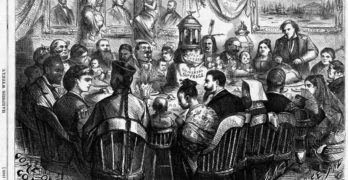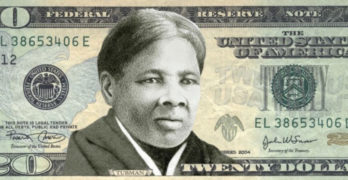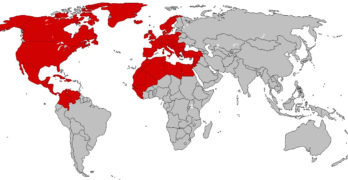 When God confronted Adam with his sin, he blamed Eve and thereby forfeiting his God-given responsibility which led to a spirit of blame and irresponsibility entering the human race. The Bible says: “The man replied, ‘It was the woman You gave me who gave me the fruit, and I ate it’ (Genesis 3:12). In other words, Adam was telling God that because He was the One who gave Eve to him, and she was the one who gave him the fruit, therefore it was God and Eve’s fault that he ate the fruit.
When God confronted Adam with his sin, he blamed Eve and thereby forfeiting his God-given responsibility which led to a spirit of blame and irresponsibility entering the human race. The Bible says: “The man replied, ‘It was the woman You gave me who gave me the fruit, and I ate it’ (Genesis 3:12). In other words, Adam was telling God that because He was the One who gave Eve to him, and she was the one who gave him the fruit, therefore it was God and Eve’s fault that he ate the fruit.
The Bible says: “The man replied, ‘It was the woman You gave me who gave me the fruit, and I ate it’ (Genesis 3:12). In other words, Adam was telling God that because He was the One who gave Eve to him, and she was the one who gave him the fruit, therefore it was God and Eve’s fault that he ate the fruit.
Adam was suggesting that God was responsible for the choice and decision that he made. If Eve had used other means of force to give the fruit to Adam, then the woman would have been responsible, but she didn’t force him in any way; it was Adam’s choice alone.
The woman said that it was the serpent’s fault. Since God put the serpent in the garden, she was also implying that the whole thing was God’s fault. If Adam had not tried to blame Eve, or even God, but had responded in repentance, God could have forgiven him on the spot. History might have turned out very differently. Instead we have the same problem of blaming each other for our sins. Cain blamed Abel and killed him and the list goes on and on.
Although Adam blamed God when he sinned, God will never tempt us, but He will test us. This difference is God’s tests are “open book tests.” He tests us in the hope that we will pass those tests. In fact God has promised us that we will never be tempted more than we can bear-which means that the devil is totally under God’s control.
He cannot touch us unless He gets permission from God first. A good example would be the experience of Job. It’s the devil who tempts us and wants us to fail. In fact he wants to steal kill and destroy. However, he can only tempt us by own evil desires (lust, passions) which he uses to make us take his bait.
James also teaches us that there is a difference between being tested and being tempted:
Blessed is the man who endures temptation; for when he has been approved, he will receive the crown of life which the Lord has promised to those who love Him. Let no one say when he is tempted, “I am tempted by God”; for God cannot be tempted by evil, nor does He Himself tempt anyone. But each one is tempted when he is drawn away by his own desires and enticed. Then, when desire has conceived, it gives birth to sin; and sin, when it is full-grown, brings forth death. (James 1:12-15)
Temptation comes from our own evil desires not from God so there is no point in blaming God or someone else when we are tempted as Adam and Eve did. When Adam and Eve sinned, they felt a great amount of guilt which happens to everyone of us. This guilty conscious bothers you that you broke God’s laws, and you start blaming others, which is then translated into your body. As a matter of fact scientists discovered that we have no enzymes or chemicals to handle guilt. It is only the blood of Jesus Christ that can set us free from this guilt of sin.
What about the Consequences?
The Bible says, “Sin entered the world through one man, and death through sin, and in this way death came to all men, because all sinned.” (Romans 5:12) It was through Adam that sin entered the world. When Adam sinned, he immediately died spiritually—his relationship with God was broken—and he also began dying physically—his body began the process of ageing and dying. From that point on, every person born has inherited Adam’s sin nature and suffered the same consequences of spiritual and physical death.
The good news is that Jesus paid for our sins and offers us His righteousness. He personally bore our sins in His own body on the tree [as on an altar and offered Himself on it], that we might die (cease to exist) to sin and live to righteousness. By His wounds you have been healed. (1 Peter 2:24)For our sake he made him to be sin who knew no sin, so that in Him we might become the righteousness of God. For as in Adam all die, so also in Christ shall all be made alive. (2 Corinthians 5:21-22)
But becoming a Christian doesn’t necessarily fix all things. When convicted of our sin, we sincerely repent, and ask God to forgive us. He forgives us and sometimes the consequences of our sins are removed. The only problem is God will not stop the natural consequences of our sin from affecting our lives and the lives of our loved ones.
Sometimes the consequences will cause great problems years later. David a man after God’s own heart broke five of the Ten Commandments. He thought his sin with Bathsheba was dealt with forever, but the consequences caught up with him years later and almost caused him to lose his life and throne. At the time when he should have been enjoying his life and honours, David was forced to flee from his palace in fear after the betrayal of his son and his close counselor.
God does not change the law of cause and effect. Everything about you and me will change once you repent, but your circumstances might not change immediately. This is what most Christians don’t understand. Personally I am still reaping from some bad choices. Behind me are things I regret and people I have hurt terribly that I wish I could go back in time and change the past, but I cannot apart from repenting and asking forgiveness in order to build a better tomorrow. We cannot blame other people for our sins or on our past environment because that can never deliver us from the consequences of those mistakes until we accept the responsibility of our sins which means repentance. To repent is to acknowledge that it is our fault, and we sinned or made a mistake.
It’s the repentance inspired by the Holy Spirit that results in forgiveness and reconciliation, with God and man. For godly grief and the pain God is permitted to direct, produce a repentance that leads and contributes to salvation and deliverance from evil, and it never brings regret; but worldly grief (the hopeless sorrow that is characteristic of the pagan world) is deadly breeding and ending in death. (2 Corinthians 7:10)
Every now and again; the Holy Spirit will put you through the process conviction, repentance, obedience and then joy. Just when you start to think that your heart is pure and spotless, the Spirit of God reminds you of your hypocrisy, bitterness un-forgiveness, lust or any kind of sin you actually forgot about.
Temptation promises that which self desires and when we desire the pleasures of sin more than we desire being in God’s presence we will fall. So we have to take our crosses daily and to die to everything in our souls and minds that contradicts God’s truth.
I am reminded of a story I heard from a Chinese convert. When the missionary asked him how he was coping with life as a Christian, he said, “It feels as if I have two dogs fighting within me, one white and one black.” “Which one is winning?” asked the missionary. “It depends which one I feed,” came the reply. The battle can only be won on your knees.
We think that to die once is sufficient but the temptations and the spirit of the world, loosed upon this generation is so strong in these evil days—that it is only in a continual daily crucifying of the flesh that we can withstand temptation. The devil, the flesh, and the world are too much for any man or woman! The old man may be dead, but he won’t lie down! The struggle with sin can be greater after conversion than before.
Most of the New Testament is addressed to believers and it’s full of exhortations to continue the moral and spiritual battle until the final victory is won. (See Hebrews 12:14; Philippians 3:14) We are to keep ourselves in the love of God, looking for the mercy of our Lord Jesus Christ unto eternal life. And on some have compassion, making a distinction; but others save with fear, pulling them out of the fire, hating even the garment defiled by the flesh. (Jude 21-23)
It’s the reason Jesus says not to judge and criticize and condemn others who have fallen from grace or you too you will judged and then He finishes by saying, that we are to first remove the plank from own eye, before we will see clearly to remove the speck from our brother’s eye. (Matthew 7:1-5)
There is a story that says a few years ago two elders had the task of approaching a man in their church who was in an adulterous relationship. On their way to the man’s home one elder said to the other, “Do you believe that you could fall into this sin?” the reply: “No I cannot.” The elder who asked the question then said, “You are not qualified to go in and approach this man” and the visit was cancelled.
Paul admonishes us in Galatians 6:1 that brethren, if a man is overtaken in any trespass, you who are spiritual restore such a one in a spirit of gentleness, considering yourself lest you also be tempted. The lesson here is: the person who knows full well that he or she could do the very same thing if at all it’s not by the grace of God is the only person qualified to help a fellow Christian caught in any kind of sin.
The Bible says, He who trusts in his own hear is a fool but whoever walks wisely will be delivered. (Proverbs 28:26) We all depend on the grace of God to empower us to live in holiness and victoriously in every area of our lives. You cannot be a better person through will power or human effort. It takes the supernatural, all sufficient grace of Jesus Christ.


















































